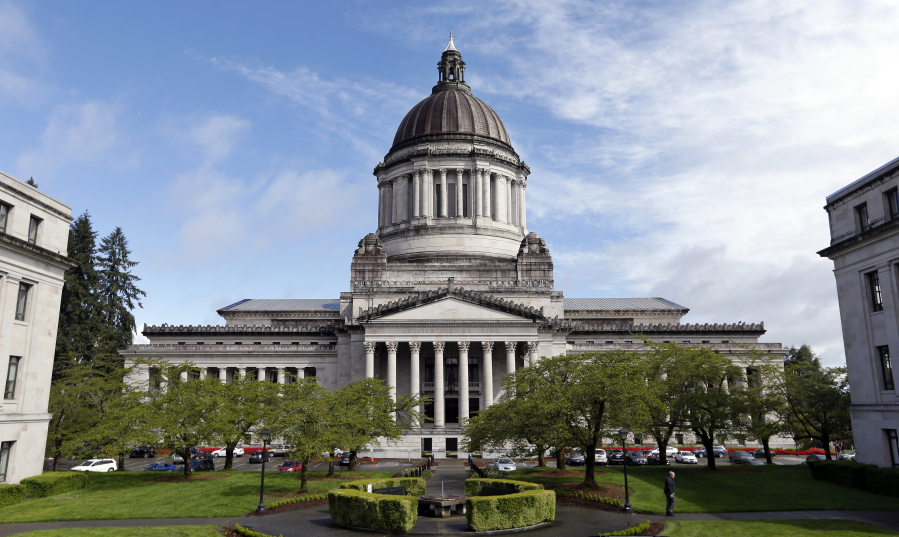A timeline of the public records law in Washington
A coalition of news organizations led by The Associated Press is suing the Washington Legislature over its assertion that state lawmakers aren't required to turn over daily schedules, text messages, emails and other materials related to their work. Here's a look at a timeline of the public records law in the state:
—1971: Law is passed defining legislative records. Defines legislative records as "correspondence, amendments, reports, and minutes of meetings made by or submitted to legislative committees or subcommittees and transcripts or other records of hearings or supplementary written testimony or data thereof filed with committees or subcommittees in connection with the exercise of legislative or investigatory functions, but does not include the records of an official act of the legislature kept by the secretary of state, bills and their copies, published materials, digests, or multi-copied matter which are routinely retained and otherwise available at the state library or in a public repository, or reports or correspondence made or received by or in any way under the personal control of the individual members of the legislature."
—1972: 72 percent of the state's voters approve a sweeping initiative that deals with campaign finance, lobbying and public records. The measure says that the public records provision of the act shall be "liberally construed" to promote full disclosure and "full access to public records so as to assure continuing public confidence in fairness of elections and governmental processes, and so as to assure that the public interest will be fully protected."
—1977: A measure that makes other tweaks to the state' public records act removes the phrase "public official" from the definition state agency. A section-by-section summary of the bill provided by the House at the time says it revises the definition in order "to be more specific in encompassing all governmental units at each level of state and local government."
—1986: Washington state Supreme court rules — in Nast vs. Michels — that the Public Disclosure Act does not apply to court case files because common law already establishes access to those files and because the PDA does not specifically include courts or their case files in its definitions.
—1995: The underlying public records act is amended to say public records held by the secretary of the Senate and the chief clerk of the House are considered legislative records as defined under the 1971 statute. The language — which was not in several earlier versions of the bill that — appeared in a "striking amendment" that was added on the House floor in the final days of session.
—2003: Democratic Sen. Marilyn Rasmussen introduces a bill that would have specifically added "state legislative offices" to the language added in 1995. A bill report prepared at the time notes that it seeks to apply the same standard for disclosure to lawmakers because "it appears that there could be a different standard for public disclosure of records in the possession of individual legislators than there is for records in the possession of the Senate and House of Representatives as institutions." The bill never received a public hearing.
—2005: A floor amendment offered by Rasmussen to an unrelated public records bill that, as the 2003 bill did, seeks to add "state legislative offices" to the legislative record definition is approved by the Senate. House leadership balked at the change and the language was not adopted.
—2009: The state Supreme Court, in Federal Way v. Koenig, ruled that the judiciary in Washington is exempt from public disclosure requirements under the state's Public Records Act.
—2011: In its ruling in Yakima County v. Yakima Herald-Republic, the state Supreme Court upheld its contention that court records are exempt from the state Public Records Act, as established in its 2009 ruling, but it ruled that court records held by other agencies are not exempt. The high court ruled in favor of the Yakima paper's quest for access to an estimated $2 million in billing records for court-appointed attorneys in a 2005 murder case. The court found that, as a nonjudicial agency, Yakima county violated the Public Records Act when it failed to release the documents.
—2013: In an 8-1 decision, the Washington state Supreme Court ruled that the governor is allowed to claim "executive privilege" as a reason to withhold documents from the public even though that exemption isn't among the hundreds listed in state law. In its ruling, the majority said the governor's office has an inherent privilege as a result of the constitutional separation of powers. Justices did provide some qualifications in their decision, saying the privilege only applies to communications made to inform policy choices. The court also said a person requesting public records can argue that the need for the material outweighs the public interests served by protecting the communication. When he took office that same year, Gov. Jay Inslee said he did not intend to exercise the executive privilege exemption unless it was explicitly provided by the Legislature or a vote of the people. To date, he has not.
—2016: The State Supreme Court enacts a rule regarding public access to administrative records that confirms the right of the public to examine administrative records of the judicial branch but lays out specific exemptions, including requests for judicial ethics opinions, minutes of meetings held exclusively among judges, along with any staff, and preliminary drafts, notes, recommendations, and intra-agency memorandums in which opinions are expressed or policies formulated or recommended. The rule also notes that chambers records — such as any writing that is created by any judicial office or staff — are not administrative records and are not subject to disclosure. However, records created by staff outside of the judge's chambers — such as emails court employees either sent or received from a judge — are disclosable.
—2017: A coalition of news organizations, led by The Associated Press, sues the Legislature to challenge its assertion that most lawmakers' records are not subject to public disclosure.



